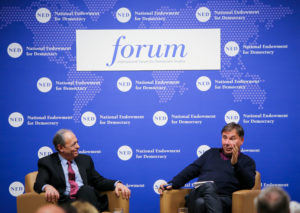The recent European parliamentary elections offered some optimistic liberals a chance to gloat, Ishaan Tharoor writes for The Washington Post:
“The so-called populist wave, I think it was contained,” declared Martin Selmayr, the influential secretary general of the European Commission. Speaking at a Politico panel on Monday, Selmayr was reacting to a slate of results across the continent that saw the far right eat away at traditional centrist parties, but also get checked back by an increased vote for pro-Europe and environmentalist factions. “The real winner of this election is democracy,” he concluded.
But others didn’t share Selmayr’s enthusiasm. Parties that were once part of an extremist fringe are now settling into the status quo, Tharoor adds.
 People once “voted against the establishment in European elections to send a message, but no one really wanted these politicians to try their hand at governing. These parties were not seen as serious about policy; they were just playing politics,” according to Bulgarian commentator Ivan Krastev (right), an associate of the National Endowment for Democracy. “Now, there is no choice but to admit that the populist far right is becoming a permanent feature of European politics.”
People once “voted against the establishment in European elections to send a message, but no one really wanted these politicians to try their hand at governing. These parties were not seen as serious about policy; they were just playing politics,” according to Bulgarian commentator Ivan Krastev (right), an associate of the National Endowment for Democracy. “Now, there is no choice but to admit that the populist far right is becoming a permanent feature of European politics.”
Will Spain Be the Savior of Social Democracy in Europe? asks Omar G. Encarnación, professor of political studies at Bard College, and author of Democracy without Justice in Spain: The Politics of Forgetting (2014). As the eurozone’s fourth-largest economy, Spain may also be both a leading indicator of, and a significant influence on, changing political tides in Europe, he writes for the NYRB:
As some observers have noted, there is already a social-democratic wave gathering force through Europe’s periphery. Today, the left is in power in Portugal, Greece, and Scandinavia—in the Nordic countries, social democrats hold power in Sweden, are in a governing coalition in Finland, and are expected to prevail in Denmark in upcoming elections.
Or are there alternative routes for renewing (social) democracy, as Tony Blair, et al, discuss (above).







